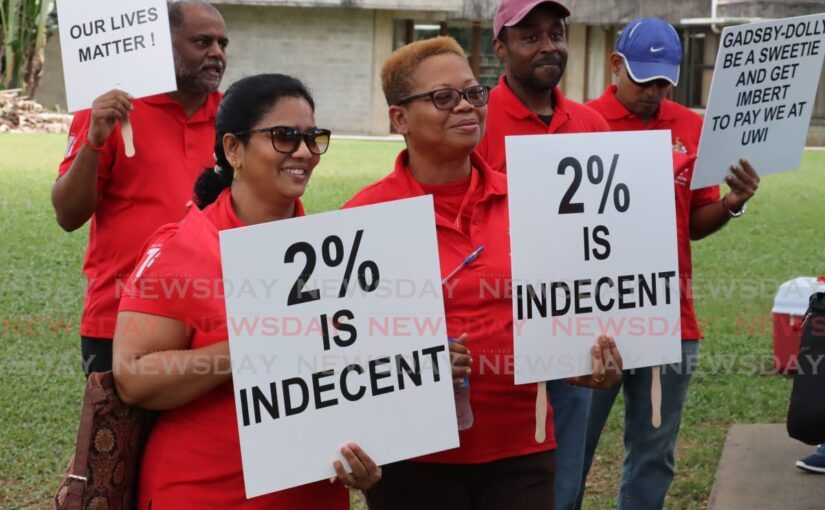Dr Rita Pemberton THE IMPLEMENTATION of the laws which reduced the conduct of the human trade with particular colonies (including Tobago) in 1806,...
Vous n'êtes pas connecté
- English
- Français
- عربي
- Español
- Deutsch
- Português
- русский язык
- Català
- Italiano
- Nederlands, Vlaams
- Norsk
- فارسی
- বাংলা
- اردو
- Azərbaycan dili
- Bahasa Indonesia
- Հայերեն
- Ελληνικά
- Bosanski jezik
- українська мова
- Íslenska
- Türkmen, Түркмен
- Türkçe
- Shqip
- Eesti keel
- magyar
- Қазақ тілі
- Kalaallisut ; kalaallit oqaasii
- Lietuvių kalba
- Latviešu valoda
- македонски јазик
- Монгол
- Bahasa Melayu ; بهاس ملايو
- ဗမာစာ
- Slovenščina
- тоҷикӣ ; toğikī ; تاجیکی
- ไทย
- O'zbek ; Ўзбек ; أۇزبېك
- Tiếng Việt
- ភាសាខ្មែរ
- རྫོང་ཁ
- Soomaaliga ; af Soomaali
Rubriques :
 Maroc - NEWSDAY.CO.TT - A la Une - 16/Jan 05:37
Maroc - NEWSDAY.CO.TT - A la Une - 16/Jan 05:37
Pugnacious politics – Tobago 1838-1855
Dr Rita Pemberton THE IMPLEMENTATION of the laws which reduced the conduct of the human trade with particular colonies (including Tobago) in 1806, terminating the trade in captive Africans in 1808, the legal ending of enslavement by the Emancipation Act of 1834, and the premature termination of the apprenticeship system in 1838 sent strong signals to the members of the colonial legislatures in the British Caribbean of the imperial government's determination to assume full control of the administration of its colonies. From very early in their establishment, the history of the colonial administrations was marked by conflict with the imperial government over aspects of policy and on the question of the source of their authority. The clashes most often occurred over the laws which the colonials favoured and which the imperial authorities did not support. Matters came to a head over questions related to slavery when imperial interest was no longer aligned with the concerns of the sugar colonies. These laws, which were implemented between 1806 and 1838, stimulated the opprobrium of the colonial legislators, whose membership fought back in what was a contest for power. Matters relating to these issues provided the fires under the political cauldron in which the enraged Caribbean plantocracy spewed their venom at the imperial authorities with a determination to defy the imperial dictates by challenging their impositions to defend their political, economic and social interests. Embittered by the blast of imperial encroachment on what they regarded as their powers by birthright, the members of the Tobago Council and Assembly and the planting fraternity which they represented were in warlike mode against the imperial government. They were incensed by imperial refusal to heed their arguments against the implementation of these policies. They had asked the imperial government to consider the island’s historical experience regarding the intent to restrict the trade in captive Africans to Tobago because, they argued, the island never had a chance to obtain its desirable work force because of the disputes between Britain and France and the subsequent fall-out over American independence. They considered the termination of enslavement a fatal economic and social wound and their representatives contributed to the failed effort to derail the anti-slavery movement. Tobago planters abhorred the premature termination of the apprenticeship system in 1838, arguing that the laws of 1834 an 1838 created labour problems on the island. To this was added the 1846 Sugar Duties Act, which added insult to injury because it rendered Tobago’s sugar unable to compete and virtually pulled the bottom out of Tobago’s sugar market possibilities. They felt the imperial government had not considered their welfare in the imposition of these laws and refused to give a listening ear to the voices from the Caribbean. But for them, the new laws signalled an erosion of their political power and stimulated challenges to their economic power, neither of which they were prepared to accept without a fight. For its part, the imperial government wanted to ensure that the practices of good government were displayed by the administration of the colonies and away from the narrow-mindedness of the assemblies. This played out in a contest between the representatives of the imperial government on the island and the legislative bodies through which the assembly sought to reduce the powers of the executive and assign them to itself. Every disagreement provided the basis for bitter quarrels between the antagonists. Although both combatants were locked in a power struggle, it was by no means a two-way battle, for although not specifically mentioned in the war of words, there was an elephant in the room, the presence of which clouded the views of both combatants. The Tobago plantation owners, who, unwillingly, had to face the social impact of the four sets of laws on the society in which they lived, were concerned about the social impact of the laws. They did not want to have to operate in a society in which they were bereft of control over the people who were designated and expected to remain permanently as estate labourers. They had to deal with the freed African population who stood in contest against the planters and were equally determined to make their liberation real. However, there was unison between the Tobago Assembly and the representatives of the imperial government where the non-white population was concerned. Both were not interested in any radical social change in the Tobago society and, like its counterparts in Jamaica, the Tobago Assembly used intransigence as its weapon against the imperial government. The members' idea was to use their powers to embarrass the imperial government to force a change of policy in their favour. The leading attorneys on the island, who were owners or representatives of plantation owners, assumed control of the Tobago Assembly, led the charge to assert the power of the assembly and defy the imperial government. Between 1846 and 1848 the assembly refused to vote funds to support the operations of the public service. The Supplies Act for 1848 was passed in 1849 causing payment of salaries of government employees to be in arrears for over two and a half years. Although the strategy embarrassed the imperial government, contrary to the intent of the assembly, the members of the executive on the island were convinced that the actions of the assembly demonstrated the need to make a change – either dissolve the assembly or widen the franchise to include new voices into the decision-making process. In addition to the realisation of the fact that the assembly would not be party to its dissolution, there was a concern which was shared by both sides of the political divide – the coloured population, some of whom were already landowners with an interest in politics. This group was seen as politicians in waiting and neither the imperial nor the colonial legislators were anxious to include coloureds in the administration. For both groups, it was important to preserve the power of a white ruling class on the island. Despite this sentiment, there was an emerging group of coloured and black landowners who expressed their views on all matters pertaining to the island. In addition, while there was no voice representing the labouring class, the members of this group, by their resistance methods, indicated their determination to overcome the barriers that were imposed on them. New elections were held in September 1847 but there were no plans for widening the franchise which, of course, was not acceptable to the members of the assembly. Non-whites remained excluded from the island’s political life and the welfare of the labouring class was high on the agenda of the administration. The conflict between the two legislative and executive arms of government was sharpened by the 1852 Land Tax Act, which caused a riot in Scarborough. This act proposed the imposition of heavy land taxes on all land, whether or not occupied, to be paid by all users rather than owners. The people had spoken. The local Privy Council requested clarification and Henry Yeates intervened, declaring that the tax was to be paid by owners. This incident provided the executive with support for dismantling the assembly. However, it was again recognised that the assembly would oppose any attempt to remove its control over the finances of the island. In fact, the assembly made it clear that it was not prepared to give up its powers but, undoubtedly influenced by developments in Jamaica, stated that it would work with an executive committee. This policy of intransigence that was tried by the Jamaican Assembly failed and was replaced by conciliation, with the imperial government promising to provide state aid to immigration to Jamaica and, without addressing the right of the white colonists to self-government, introduced the first executive committee in Jamaica in 1854. In the attempt to remove the stranglehold of the Tobago Assembly, an executive committee was established in Tobago in 1855 and the strategy of the imperial government to take over administration of its Caribbean colonies was effected without further vitriolic exchanges. The post Pugnacious politics – Tobago 1838-1855 appeared first on Trinidad and Tobago Newsday.
Articles similaires
'Reconquering' Tobago: The formula of Justice Gorrie
Dr Rita Pemberton THE IMPACT of the union of Trinidad and Tobago was most immediately felt in the legal sphere, for it resulted in the...
The Tobago Metairie Ordinance of 1888
Dr Rita Pemberton TOBAGO’S post-emancipation labour problems were manifested in the operations of the metairie system which, from the 1840s, was...
The Tobago Metairie Ordinance of 1888
Dr Rita Pemberton TOBAGO’S post-emancipation labour problems were manifested in the operations of the metairie system which, from the 1840s, was...
TSTT ordered to pay $5m to workers retrenched in 2018
The Telecommunications Services of Trinidad and Tobago (TSTT) has been ordered to compensate 500 former workers retrenched in 2018. The Industrial...
The Constitution Has Gone AWOL: From Presidential Power Grabs To Martial Law – OpEd
That didn’t take long. Within days of Donald Trump’s second term, the U.S. Constitution and Bill of Rights disappeared from the White...
Zebapique mas bandleader: Sports and culture can reduce crime in hotspot communities
Zebapique Productions band leader Andrew Alleng believes sports and culture are the things to change the country’s crime situation, as they bring...
Guild urges UWI students: Don’t boycott classes in wage dispute
THE UWI Guild of Students, St Augustine, has urged its members not to boycott classes as the new semester begins on January 20, despite the ongoing...
Opposition Leader: Why call SoE now?
Opposition Leader Kamla Persad-Bissessar asked why the government called the state of emergency (SoE) in December 2024 rather than in January 2024...
Technocracy, Fear-Mongers, And The Conspiracy – OpEd
The term, ‘conspiracy theory’ became part of common parlance during the ‘Covid era,’ but although all of us know what it refers to – and...
Les derniers communiqués
-
Aucun élément






